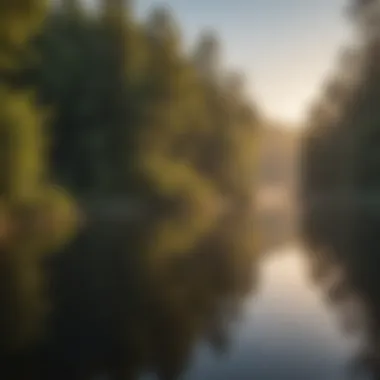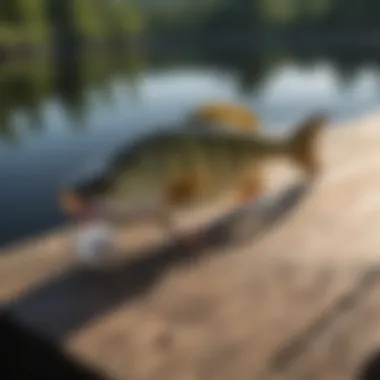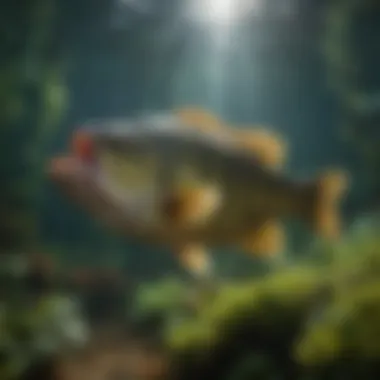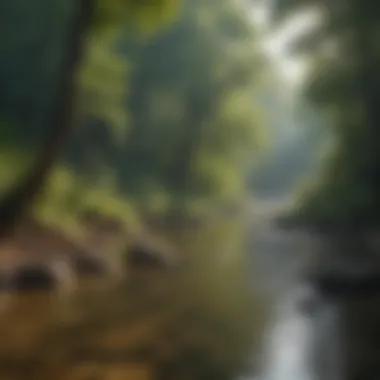Discover Premier Bass Fishing Spots in West Virginia


Intro
West Virginia is a state rich in natural beauty and diverse ecosystems. This environment provides an excellent backdrop for bass fishing enthusiasts. The variety of lakes and rivers, paired with a unique array of aquatic life, makes West Virginia a prime destination for both novices and advanced anglers. Understanding the nuances of this region can significantly enhance the fishing experience. Effective techniques, seasonal patterns, and environmental factors play a crucial role in successful bass fishing.
Bass fishing, while thrilling, also calls for an appreciation of sustainability and ecological balance. Engaging in responsible fishing practices ensures that these natural resources remain available for future generations to enjoy.
In this article, we will examine key bass fishing locations, essential fishing techniques, seasonal considerations, and regulations. We will also explore the importance of sustainability in fishing practices. Understanding these aspects can greatly improve the chances of a successful outing, while also promoting a healthier environment.
Prelims to Bass Fishing in West Virginia
Bass fishing in West Virginia is not simply a recreational activity; it is an exploration of a diverse aquatic ecosystem enriched with a variety of bass species. This region offers unique fishing opportunities, drawing in anglers from various backgrounds. Understanding the nuances of bass fishing here is crucial for success.
Overview of the Bass Species
West Virginia is home to several bass species, primarily the largemouth and smallmouth bass. The largemouth bass prefers warmer, shallow waters and can be found in lakes, ponds, and rivers. Their large mouths enable them to consume a wider range of prey, making them a popular target for anglers. Conversely, the smallmouth bass thrives in cooler, clearer waters and is often found in rivers and streams. They are known for their strong fighting ability, which adds to the thrill of catching them.
Both species offer unique challenges and rewards for anglers, making the selection of bait and technique of utmost importance. In addition to these two prominent species, West Virginia also features other fish such as rock bass, which further enrich the fishing landscape.
The Appeal of West Virginia’s Natural Habitat
The natural habitat of West Virginia plays a significant role in attracting anglers. The state boasts diverse landscapes that include rivers, lakes, and mountain streams. The Monongahela National Forest, for example, provides a pristine environment for fishing. It features clear waters and lush surroundings that support a thriving fish population.
Additionally, the changing seasons influence the fishing experience. In spring, spawning behavior creates an ideal environment for bass fishing, while summer heat requires different strategies. Autumn brings unique opportunities, whereas winter offers a different kind of challenge for dedicated anglers.
In sum, bass fishing in West Virginia stands out due to its rich biodiversity and appealing natural settings. Each fishing location contributes distinct experiences, making an understanding of these environments essential for any angler aiming to maximize their success.
Key Locations for Bass Fishing
The success of bass fishing in West Virginia relies heavily on the features of its key locations. Each spot offers a unique blend of habitats, water conditions, and ecological factors that support diverse bass populations. An understanding of these locations can guide anglers in selecting the most suitable sites for maximizing their catch rate.
Monongahela National Forest
Monongahela National Forest is a prime destination for bass fishing enthusiasts. This sprawling area covers over 900,000 acres and includes numerous lakes and rivers. The forest's waters are rich in nutrients, promoting healthy fish populations.
Lakes like Spruce Knob Lake and Blackwater Falls State Park provide excellent conditions for bass. The diverse habitat, ranging from shallow bays to deeper waters, caters to different bass species. The availability of cover like fallen trees, submerged rocks, and aquatic vegetation make these spots particularly appealing for anglers seeking largemouth and smallmouth bass.
Additionally, the remoteness of some fishing spots in the forest allows for a quieter, more focused fishing experience. The natural beauty of the area also contributes to its allure.
Summersville Lake
Summersville Lake, one of West Virginia's largest lakes, is well-known for its plentiful bass population. The lake has unique features, such as its fluctuating water levels, which can significantly impact fishing conditions. The steep banks and numerous coves create ideal breeding grounds, particularly for largemouth bass.
Due to its size, Summersville Lake offers various fishing environments. Anglers can find shallow areas near the shore as well as deeper waters that can harbor large catches. The lake's amenities, including boat ramps and fishing docks, make it accessible for both novice and experienced fishermen. Thus, it stands as a vital location in West Virginia’s fishing landscape.
Mason Lake
Mason Lake, although smaller than Summersville, holds its own when it comes to bass fishing. This lake is particularly popular among local anglers due to its close-knit community and charming surroundings. Mason Lake has well-maintained access points, making it easy for anglers to reach the water.
The lake is home to healthy populations of both largemouth and smallmouth bass. Anglers have reported consistent success, particularly during the early morning or late evening hours. The local flora around the lake provides ample cover that attracts bass, thereby enhancing fishing opportunities.


Furthermore, Mason Lake's close proximity to towns enables quick trips for a few hours of fishing, making it a practical choice for busy schedules.
Cheat Lake
Cheat Lake stands out as a significant bass fishing location due to its diverse aquatic habitats. With over 13 miles of fishable waters, it provides plenty of areas for anglers to explore. The lake features both shallow and deep zones, presenting various fishing strategies.
The unique structure of Cheat Lake, with its rock formations, submerged timber, and weed beds, attracts bass throughout the fishing seasons. This location is known for producing impressive catches, making it a favorite among seasoned anglers.
"Choosing the right location is half the battle when it comes to successful bass fishing. Each site in West Virginia has unique characteristics that can impact fishing outcomes."
In summary, the key locations for bass fishing in West Virginia are not just about the fish; they provide experiences that can deepen an angler's appreciation for nature. Understanding these sites allows anglers to maximize their potential for a satisfactory catch.
Seasonal Considerations for Bass Fishing
Understanding seasonal variations is crucial for successful bass fishing in West Virginia. Bass behavior significantly changes with the seasons, influencing where and how anglers should fish. Each season presents unique challenges and opportunities, which affect bait selection, fishing techniques, and overall strategy. By recognizing these seasonal dynamics, anglers can adjust their methods to improve catch rates and enhance their fishing experience.
Spring: Spawning Season Dynamics
Spring is a pivotal time for bass fishing as it marks the spawning season. During this period, bass move to shallower waters to reproduce. This behavior can lead to increased activity levels among the fish, often resulting in more frequent bites. Anglers should focus their efforts in shallow coves or near spawning beds.
Bait selection is also important during spring. Natural baits like worms and crawfish can be very effective. Additionally, using soft plastics in darker colors can attract attention in murkier water conditions. The key is to be patient and strategic when casting, often allowing the bait to sit near the spawning spots, as bass are more likely to strike when they feel their nests are threatened.
Summer: Hot Weather Strategies
As temperatures rise in summer, bass tend to retreat to deeper, cooler water. This shift poses challenges for anglers, as the fish become less active in the heat. Here, understanding water temperature becomes vital. Fishing during early morning or late evening is often more productive due to the cooler conditions.
Effective techniques include using top-water baits or jigs that mimic small fish. It can also be beneficial to explore shaded areas and submerged structures where bass may hide during the scorching day. Adapting to these conditions and recognizing when and where bass are likely to bite yields better outcomes.
Autumn: Pre-Winter Preparation
Autumn presents a transition period. Bass begin to feed heavily to prepare for winter, providing anglers with an opportunity for substantial catches. This time of year, bass can be found near baitfish that are also moving to deeper waters. Fishing near drop-offs or at the mouths of creeks can be effective.
For bait selection, larger lures that mimic prey are recommended. Techniques like slow retrieving can help entice bites during this feeding frenzy. Knowing how the bass react in this pre-winter phase can greatly increase success rates as they bulk up for the colder months ahead.
Winter: Techniques for Cold Water Fishing
Winter fishing requires different strategies, as bass become lethargic in cold water. They often stay close to the bottom, where the temperature is more stable. Anglers must adapt by using heavier weights to reach the bottom quickly and by slowing down their retrieval.
Effective winter techniques can include dropshot methods or using jig heads with soft plastics that can be worked slowly along the bottom. Finding areas with structure, like fallen trees or rocky edges, enhances chances of locating bass. Patience is key in winter fishing, as bites may be infrequent but more rewarding when caught.
"Adapting to seasonal changes in bass behavior is essential for successful fishing in West Virginia."
Understanding these seasonal considerations allows anglers to maximize their fishing potential in West Virginia's diverse environments. They can align their strategies with the natural rhythms of bass behavior, ensuring a more fulfilling fishing experience.
Essential Techniques for Bass Fishing
Understanding the essential techniques for bass fishing is crucial for both success and sustainability. Mastering these techniques not only improves your odds of landing a trophy catch but also fosters respect for the natural environment. This section addresses the fundamental aspects that every angler should grasp to enhance their fishing experiences in West Virginia’s diverse waters.
Bait Selection and Application


Choosing the right bait is fundamental to attracting the desired bass species. Numerous types of bait exist, each with its own use and effectiveness. Natural baits, such as worms and minnows, often appeal to bass due to their commonality in the water. In contrast, artificial lures, such as crankbaits or jigs, can be highly effective when used correctly.
When selecting bait, consider the local fish population. Observing what the bass are currently feeding on can give you a significant advantage. The season also affects bait choice. During warmer months, fast-moving lures tend to be more effective, while in cooler months, slower techniques can yield better results.
Proper application of bait is equally important. Pay attention to the depth at which you fish, and adjust your technique accordingly. Employing techniques such as "drop-shotting" can allow bait to sit at the perfect level for catching bass.
Casting Techniques and Equipment
The art of casting can greatly influence your success in bass fishing. Good casting requires practice and knowledge of your surroundings. Techniques such as the overhead cast, sidearm cast, and roll cast each have unique benefits depending on the scenario. Understanding which method to use can enhance your accuracy and control, crucial for presenting bait in a manner that attracts fish.
Equipment choice is another critical element. Rod length, action, and material should be tailored to the fishing environment and conditions. A medium-action rod may provide an ideal balance for various scenarios. Pairing it with the appropriate reel type can enhance your ability to handle different line types such as monofilament or braided line, which offer distinct benefits in terms of sensitivity and strength.
Understanding Bass Behavior
To effectively catch bass, one must understand their behavior traits. Bass are opportunistic feeders, feeding based on environmental cues, time of day, and water conditions. Monitoring these factors can greatly enhance your fishing strategy.
Time of day is a significant indicator. Bass often feed more actively during early morning or late evening. During these times, they are likely near the surface or along shallows, making them easier to target. Understanding the structure of the waterbody is crucial as well. Bass tend to hold around cover, such as fallen trees, rocks, or vegetation to ambush prey.
Furthermore, weather conditions can affect bass behavior. Warmer temperatures often lead to increased activity, while cooler weather may push them to deeper waters. Being aware of these nuances allows an angler to adapt and find success consistently.
Understanding bass behavior, habitat, and how to effectively use bait and technique is essential for both catching fish and ensuring the health of the fishery.
Ecological Perspectives in Bass Fishing
Understanding the ecological perspectives in bass fishing is vital for both anglers and environmental stewards. This section navigates the interconnectedness of fishing practices and environmental health. It underscores the significance of maintaining balance in ecosystems that support bass populations. Knowing these perspectives can greatly enhance the fishing experience while promoting responsible angling to sustain fish populations for future generations.
Importance of Sustainable Practices
Sustainable fishing practices are essential in preserving fish populations and their habitats. Responsible anglers must adopt approaches that minimize harm to the environment. This can include using barbless hooks, catch-and-release strategies, and being conscious of water quality.
The benefits of sustainable practices include:
- Preserving native species: By avoiding overfishing and proper management, one can help maintain diverse bass species.
- Protecting habitat: Ensuring that fishing does not harm spawning grounds or aquatic vegetation contributes to a healthier ecosystem.
- Educating others: Sharing knowledge about sustainable practices can encourage the wider community to protect aquatic environments.
In the long term, these practices not only benefit the ecosystems but also enhance the fishing experience. Healthy fish populations lead to better fishing outcomes.
Habitat Conservation and Protection
Conserving and protecting the habitats where bass thrive is crucial for ensuring their survival. Various elements must be considered:
- Water Quality: Pollution from agricultural runoff and urbanization can severely affect water quality. Strategies should aim to minimize these effects.
- Vegetation Management: Aquatic plants play an important role in creating a suitable habitat for bass. Removing invasive species helps in promoting a balanced ecosystem.
- Buffer Zones: Establishing buffer zones around bodies of water limits development and preserves natural landscapes.
"Healthy habitats are the backbone of sustainable fishing. Protecting them is not just about the fish—it’s about our entire environment."
Efforts in habitat conservation can include participating in clean-up events or advocating for stricter regulations on waste disposal. Engaging in protection initiatives contributes to a lasting impact on both the environment and the fishing community.
Maintaining the ecological integrity of fishing areas ensures that bass fishing in West Virginia continues to be an enjoyable and sustainable pursuit.
Regulations and Licensing in West Virginia


Understanding the regulations and licensing in West Virginia is crucial for any angler aiming to engage in bass fishing. These rules not only help preserve fish populations but also ensure that the fishing experience remains enjoyable for all. Compliance with local laws is an essential aspect of responsible fishing that contributes to sustainability and ecological balance.
Angler Licensing Requirements
To legally fish in West Virginia, anglers must obtain a valid fishing license. This requirement applies to anyone aged 15 and older. Licenses can be purchased from various vendors, such as sporting goods stores or online through the West Virginia Division of Natural Resources (DNR). There are different types of licenses available, including:
- Annual Resident Fishing License: Allows residents to fish year-round.
- Non-Resident Fishing License: For those who do not live in West Virginia but wish to fish there.
- Youth Fishing License: Available for anglers aged 15 and under, often at reduced costs.
Each license type grants specific privileges regarding fishing, so it is vital to understand what your license covers. Additionally, a trout stamp is necessary if fishing for trout in designated waters. Licenses contribute to conservation efforts, funding programs that maintain and improve aquatic habitats.
Daily Limits and Size Regulations
West Virginia has established daily limits and size regulations aimed at maintaining healthy bass populations. Knowing these restrictions is critical to promoting sustainability and achieving a successful fishing outing.
- Daily Limit: The current daily limit for black bass is six fish per person. This limit applies to all bass species, including largemouth bass and smallmouth bass.
- Size Regulations: In many waters, there are specific size limits, often requiring bass to be a minimum of 12 inches long. Some locations may have additional size restrictions that prohibit keeping larger bass, ensuring the protection of mature specimens.
Anglers should always check the specific regulations for their fishing location, as these can vary based on local conditions and habitat needs. These regulations not only protect the fish populations but also enhance the overall fishing experience by ensuring that resources are available for future generations.
Always stay informed about the latest regulations to avoid penalties and contribute to the sustainability of West Virginia's aquatic ecosystems.
Resources for Anglers
Exploring bass fishing in West Virginia requires a network of resources that can provide both essential knowledge and local insights. Anglers, whether novices or experienced, benefit greatly from tapping into this network, as it enhances their chance of success and enjoyment on the water. Access to expert guidance and community support creates a richer fishing experience, fostering both learning and camaraderie.
Local Fishing Guides and Experts
Local fishing guides play a critical role for anglers looking to maximize their time on the water. These experts not only possess a wealth of knowledge about the specific bass species in West Virginia lakes and rivers, but they also understand the current fishing conditions. Many guides have years, if not decades, of hands-on experience and can offer insights on the best techniques and equipment for local waters.
Hiring a local guide can streamline the fishing process. They can provide valuable information about seasonal changes, migration patterns, and emergent fishing trends. Additionally, guides often have access to boats, gear, and bait, which can alleviate the burdens of preparation for visiting anglers.
Another benefit is the opportunity to learn directly from seasoned professionals. Here are some factors to consider when finding a fishing guide:
- Credentials: Ensure guides are licensed and have relevant certifications.
- Experience: Research guides with extensive knowledge about West Virginia’s waters.
- Reputation: Seek recommendations and read reviews from other anglers.
- Specialization: Some guides focus specifically on bass fishing, confirming that their expertise aligns with your needs.
Online Communities and Forums
In the digital age, online communities have become indispensable for anglers seeking information and support. Websites like Reddit and specialized fishing forums offer spaces where individuals can share experiences, ask questions, and seek advice about bass fishing in West Virginia. Engaging in these forums presents numerous advantages.
- Knowledge Sharing: Anglers often share reports on fishing conditions, including updates about catches or changing environments.
- Technique Discussions: Diverse fishing techniques are often discussed, allowing members to learn best practices and tips that have worked for others.
- Equipment Recommendations: Experienced anglers frequently provide suggestions on gear and bait that are suitable for specific locations and conditions.
- Community Support: Building connections with fellow anglers can be encouraging and lead to friendships built on shared interests.
Overall, both local guides and online resources provide essential support and education for anglers. They enable a deeper understanding of West Virginia’s bass fishing landscape, ensuring both successful and responsible fishing experiences.
Culmination: The Future of Bass Fishing in West Virginia
The topic of bass fishing in West Virginia deserves reflection on its future. This section emphasizes several key aspects that will influence how the sport evolves amid changing environmental and regulatory landscapes. Understanding these components is essential for both present and future anglers.
The Role of Anglers in Conservation
Anglers in West Virginia are not just participants in a recreational activity; they are crucial stakeholders in the preservation of aquatic ecosystems. Their collective efforts can lead to significant improvements in habitat conservation. By practicing catch and release, anglers help maintain fish populations. Moreover, participating in local conservation initiatives can enhance water quality and biodiversity. Engaging local communities to raise awareness about sustainable fishing practices can also yield positive long-term effects. In this way, anglers can ensure that their passion for bass fishing has a minimal negative impact on the environment.
Encouraging Responsible Fishing Practices
Responsible fishing practices must be a priority for everyone involved. Adhering to regulations regarding sizes and limits is just the start. Utilizing bait responsibly and avoiding overfishing are steps that all anglers can take. Furthermore, educating novices about ethical fishing can foster a culture of respect for nature. Regular clean-up efforts can help keep lakes and rivers free from debris that can harm fish habitats. Training resources, such as workshops, can aid in spreading knowledge about best practices. Such initiatives will contribute to the sustainability of fishing experiences in West Virginia, ensuring the waters remain vibrant for generations to come.
"The future of bass fishing in West Virginia relies on informed and engaged anglers making responsible choices that support conservation efforts."
The integration of these elements will shape the future of bass fishing in West Virginia. With the combined effort of anglers and local communities, sustainable practices can thrive, preserving the state's unique fishing landscapes.















